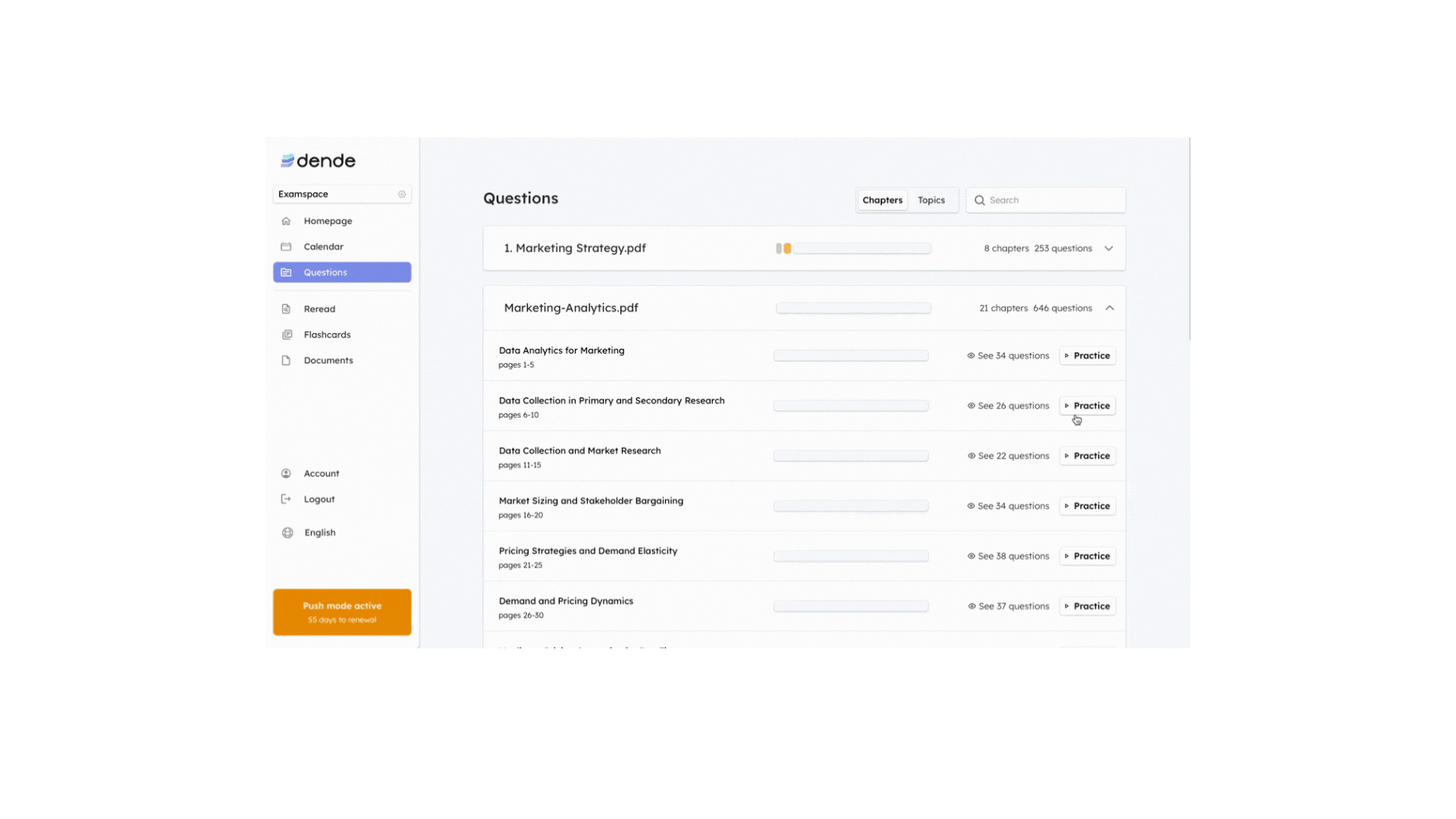Share with your student friends
ShareGet ready for your next exam
Start for freeSpaced repetition is one of the most effective study techniques out there — it helps you move information from short-term memory to long-term retention by reviewing material at carefully timed intervals. But while the method sounds simple, setting it up can quickly become overwhelming. Turning your class notes into a well-organized system of flashcards takes time and effort many students just don’t have.
That’s where AI-powered tools like Dende step in. They automate the process, transforming your notes into ready-to-study flashcards — saving you precious time and making your study sessions more efficient.
Contents
Why spaced repetition matters
Our brains aren’t wired to remember everything we see or hear in one go. Spaced repetition leverages this by spacing out reviews just before you’re about to forget, which strengthens neural connections and cements knowledge.
Many students try to use spaced repetition but struggle with the manual workload: creating flashcards, scheduling reviews, and tracking progress can feel like a second full-time job. Without a reliable system, it’s easy to fall behind or review too little (or too much).
Dende’s new study plan feature helps you organize your goals and track your daily progress, so you stay consistent without the stress.
Spaced repetition isn’t just about quantity — it’s about timing and consistency. When done right, it improves memory retention and makes exam prep less stressful.
Turning class notes into flashcards: traditional vs AI-powered
Traditionally, creating flashcards means manually going through your notes, highlighting key facts, summarizing, and then typing out questions and answers. This process is time-consuming and repetitive — sometimes so much that students procrastinate on it altogether.
AI-powered tools change the game by automatically analyzing your notes or PDFs and generating flashcards for you. Instead of spending hours typing, you upload your materials, and the AI identifies core concepts, creates questions, and organizes them with spaced repetition in mind.
The benefits are clear:
- Time savings: Instant flashcard creation means you can start reviewing sooner.
- Consistency: The AI applies the same criteria across all your notes, ensuring balanced coverage.
- Flexibility: You can customize flashcards or add your own notes as needed.
That said, manual flashcard creation isn’t obsolete — sometimes the personal touch helps with tricky topics or tailoring questions exactly to your learning style. But for most subjects and busy schedules, AI-powered flashcards offer a practical, effective shortcut.
How Dende makes it easy
Dende makes turning your class notes into flashcards effortless. Just upload your PDFs or notes, and the AI scans the content to identify key concepts, terms, and facts. It then automatically generates flashcards designed for effective spaced repetition practice.
No need to worry about formatting or question types — Dende focuses on creating clear, concise flashcards that help you actively recall information. You can also customize or add your own flashcards anytime, making your study routine truly personalized.
Real-life study scenarios
Different subjects demand different study approaches, and Dende adapts accordingly. Here are some examples of how students use Dende-generated flashcards to prepare across diverse fields — from memorizing biology terms to mastering marketing concepts and navigating complex legal principles.
Biology
When preparing for exams on cell biology, students upload detailed notes covering organelles and processes. Dende generates flashcards that focus on recalling key definitions and functions, making it easier to learn complex material without manually writing cards.
Marketing

Marketing students upload notes on theories like the 4Ps and case studies. The generated flashcards help reinforce understanding of core concepts and their practical applications, supporting a more dynamic study session.
Law
Law students face dense reading material packed with statutes and case law. Using Dende, they get flashcards that highlight critical legal terms and concepts, aiding active recall without the time-consuming manual card creation.
Tips to maximize your spaced repetition practice
To get the most out of your flashcard sessions with Dende, it helps to approach spaced repetition strategically:
- Set a realistic daily study plan. Decide how many hours or minutes you want to dedicate each day to studying. Consistency beats cramming, so even short, regular sessions add up. Dende’s platform lets you customize study goals to fit your schedule, helping you stay on track without burnout.
- Review actively and regularly. Don’t just scroll through flashcards passively. Try to recall the answer before flipping the card. The goal is to challenge your memory and reinforce learning.
- Focus on your weak spots. Pay extra attention to cards you struggle with. Dende tracks your progress and automatically surfaces the flashcards you need to review more often, so you can use your time efficiently.
- Mix new and old material. While it’s tempting to focus only on new topics, revisiting older flashcards helps maintain long-term retention. A balanced mix ensures you don’t forget earlier lessons.
- Customize when needed. Add your own notes or create personalized flashcards for tricky topics. Combining AI-generated content with your input creates a more effective study tool tailored to you.
Conclusion
Spaced repetition is a powerful study technique — and with tools like Dende, it becomes easier and faster to put into practice. By automating flashcard creation and letting you set personalized study plans, Dende helps you build strong memory habits without the hassle.
Whether you’re preparing for a tough exam or just want to learn smarter combining AI-generated flashcards with a consistent study routine can make all the difference. Ready to transform your notes into effective flashcards and boost your learning? Upload your materials and start studying smarter today.
